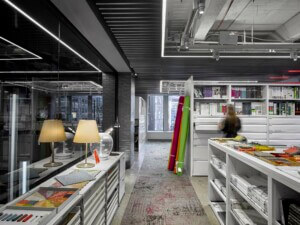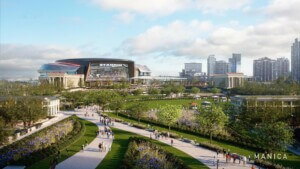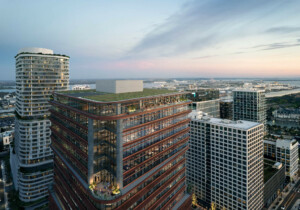In June, the Philadelphia 76ers unveiled renderings for 76 Place, a $1.3 billion mixed-use stadium complex in Philadelphia’s Chinatown. Following a series of community meetings this summer the proposal has been revised and now includes a 20-story residential tower.

As reported by AN, the proposal is designed by Gensler, alongside the 76ers subsidiary group, 76 DevCo. It seeks to move the basketball team from Wells Fargo Center on Broad Street to a new stadium on the corner of Market Street and 10th Street—a location that would be reachable via public transit on SEPTA’s Jefferson Street Station and provide a slew of non-gameday programming to “support the revival of Center City.”
Chinatown derided the development even before initial design concepts were released. Concerns centered on game day festivities bringing forth more gentrification and a lack of community input. The Philadelphia Chinatown Development Corporation said the new development “deeply imperils the future of Chinatown.” The Philadelphia Inquirer called it an “existential threat.”

After vehement community pushback, Gensler and the 76ers have since gone back to the drawing board. Yesterday, the Sixers issued revised plans showing what an alternative could look like. The new design’s most noteworthy feature is a 20-story residential tower on Cuthbert Street, to be built on top of a former Greyhound Bus Station. The new tower would accommodate 395 housing units, 79 of which are affordable at below-market rates.
“Our goal is to deliver a new privately funded arena that makes a positive and lasting impact on our city by promoting inclusive community development that will generate more than 10,000 local jobs, more than $1B in new tax revenues for the city, state, and School District of Philadelphia, and be a catalyst for the revitalization of East Market Street,” said David Adelman, 76 DevCo’s chairman, in the press release. “We are excited to share the latest conceptual renderings of the project, inspired by community feedback and studying the best aspects from 28 of 30 NBA teams with existing downtown arenas.”

Since June, project stakeholders have contributed an additional $250 million in private investment to finance the improvements, which raises the project cost from $1.3 to $1.55 billion. Still, not everyone is convinced. On Instagram, Philadelphia architecture critic Inga Saffron called the updated proposal “more of a marketing effort than real architectural design.” She also said that the new renderings “leave a lot of questions unanswered.”

Neeta Patel, interim executive director of Asian Americans United, said, “We all agree Philly needs more affordable housing, and history shows these arena developers won’t actually build it. We can’t trust the claims of these developers, who have built their careers and fortunes on displacement.”

After 75 community meetings, what 76 DevCo calls a “listening tour,” it seems that stakeholders may have more homework to do. Save Chinatown Coalition’s Jenny Zhang said of the updated proposal, “There is a need for affordable housing, but we can’t trust these folks with what they’re saying. Like I said, they’ve made their careers off of displacement and helping to create the housing crisis.”











